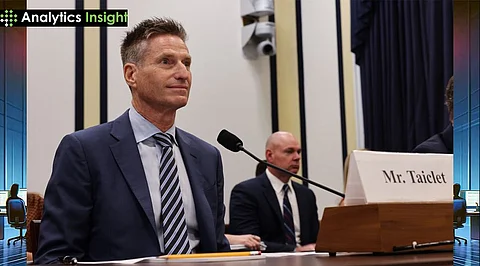

Jim Taiclet is the chairman, president, and CEO of Lockheed Martin, where he leads the company's vision for 21st-century security. His focus is on integrating the aerospace, defense, technology, and telecommunications industries through open systems and standards-based architecture.
Taiclet's strategy emphasizes the increasing use of advanced digital and physical technologies for defense missions on domestic soil. He aims to strengthen deterrents while ensuring the security of the United States and its allies by enhancing defensive preparedness and avoiding conflict.
James Taiclet was born in 1960 in Pittsburgh, Pennsylvania. His father, James Sr., served in the U.S. Army at Wiesbaden Air Base in Germany before becoming a boilermaker in Pittsburgh. His mother, Mary Ann, was a homemaker and school administrator. Taiclet's upbringing in a family that cherished military and public service helped determine his career direction.
Taiclet graduated in 1982 from the United States Air Force Academy with a engineering and international relations degree. At the United States Air Force Academy, he also played rugby and was a rugby team captain during his senior year. He also obtained a master's degree in public affairs from Princeton University. Taiclet is a fellow at the School of Public and International Affairs at Princeton University.
Taiclet began his career as a pilot in the United States Air Force from 1985 to 1991, serving as an aircraft commander, instructor pilot, and unit chief of standardization and evaluation. He flew several missions during Operation Desert Shield in a Lockheed C-141 Starlifter. In addition, he had rotational assignments with the Joint Staff and Air Staff at the Pentagon.
In 1991, Taiclet joined the private sector as a management consultant at McKinsey & Co. He then served as a leader of Pratt & Whitney and Honeywell Aerospace Services. In 2001, he joined American Tower as the COO; in 2003, Taiclet was appointed CEO. In 2018, the visionary leader was elected to Lockheed Martin's board. Taiclet was named Lockheed Martin CEO in 2020 and chairman in 2021.
Lockheed Martin's AI approach, led by Jim Taiclet, is primarily related to cybersecurity, autonomous systems, operational efficiency, and innovation. It utilizes advanced technologies to strengthen defense capabilities, optimize operations, and drive cutting-edge research and development.
AI for National Defense: Taiacute underlined that AI would be transformative in his strategies of integrated deterrence. Lockheed Martin uses AI to bolster the velocity, resiliency, and interoperability needed to ensure its military readiness in complex security landscapes.
Seamless Interoperability through AI: Lockheed Martin supports modularity and open architecture standards to achieve efficient integration of AI solutions by US and Allied forces. It also fosters collaboration with defense primes, start-ups, and international partners.
AI and Cybersecurity: Lockheed Martin uses AI-based cybersecurity to protect its defense systems by deploying advanced tools that help effectively detect and mitigate the latest evolving cyber threats.
AI-Driven Predictive Analytics: AI infusion in defense systems strengthens proactive defense approaches by predicting and countering cyberattacks, which provides strong national security.
AI in Military Applications: Through its investments in autonomous systems powered by AI, Lockheed Martin improves the capability in air, land, and naval operations while keeping human personnel safe from risks.
Collaboration with Tech Innovators: Collaboration with technology companies accelerates AI integration into defense solutions, helping fast-track the deployment of advanced autonomous systems.
Supply Chain Resilience through AI: AI-based analytics optimize Lockheed Martin's supply chain to be highly scalable, increasing resilience to geopolitical tensions and labor shortages.
AI-Powered Logistics: Its strategic expansion into allied nations with production facilities will enhance Lockheed Martin's responsiveness across the battlefield.
Facilitating Allied Collaboration: AI shares real-time data and coordinates with allies to synchronize efforts in joint defense operations between the U.S. and its allies.
By the end of December 2024, James D. Taiclet's net worth was estimated to be around $83 million. He holds 395,682 shares worth $82 million in American Tower Corp. Taiclet also sits on the board of Lockheed Martin Corp., owning 1,354 shares valued at around $704,540.
Jim has led the company to great success in the defense market. During his tenure, Lockheed Martin earned a record business backlog and became the world's largest defense contractor. Innovation, in both the aerospace and cyberspace fields, serves as central tenets during Taiclet's stewardship so that Lockheed Martin remains at the forefront of the technologies being developed while driving sustainable growth and operating efficiency. The strategic insight he has positioned the organization in a position of perpetual success in an increasingly competitive global marketplace.
Lockheed Martin was involved in several controversies involving government contracting, corruption, environmental concerns, and labour disputes, which yielded massive legal settlements.
Government Contracting: In various government contracts, Lockheed Martin has been accused of overcharging, cost overruns, and false claims. The major issues are the overcharging of military programs and NASA projects and violations of the Arms Control Export Act.
Bribery and Questionable Payments: It is also involved in bribery scandals, foreign payoffs, and infractions of the Foreign Corrupt Practices Act. Among the key scandals of the 1970s were the questionable payments of $38 million made to officers of other countries.
Environment and Product Safety: Lockheed has been criticized for environmental pollution, including groundwater contamination and alleged environmental racism. Settlements and cleanup plans were implemented, but disputes remain over accountability and timelines for remediation at affected sites.
Labor: The company dealt with various cases of employment discrimination. One such age and racial bias case had amassed multi-millions. The company also witnessed some union strikes. These strikes were due to issues with pension changes and poor working conditions.
